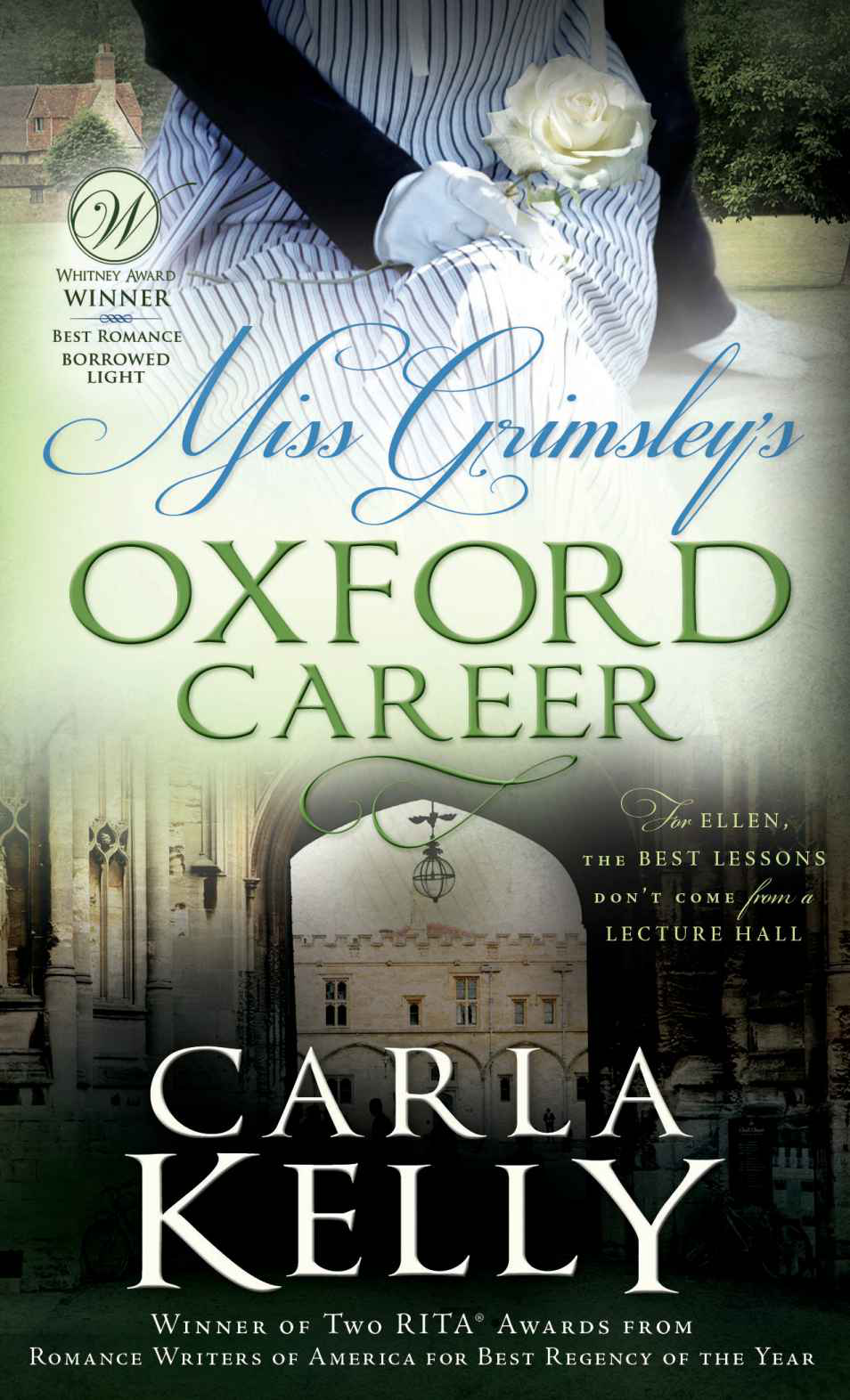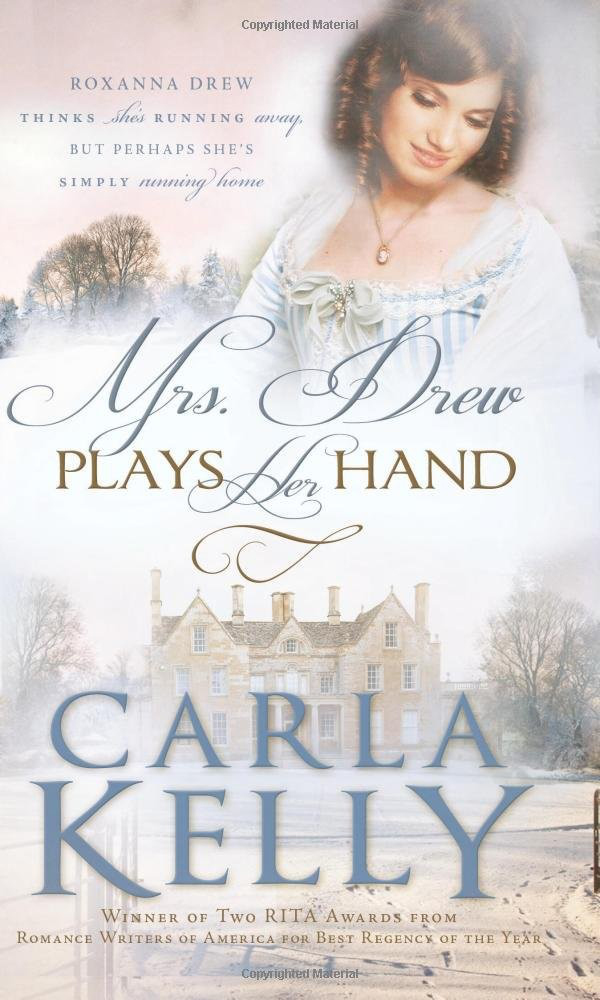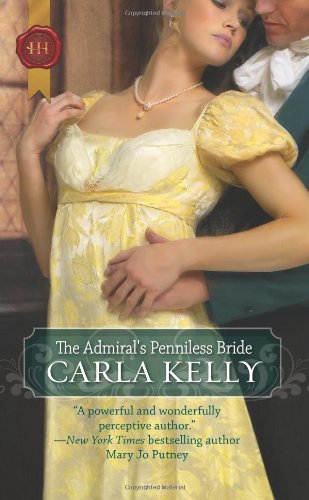Carla Kelly
Books: Romance | Historical
Miss Grimsley's Oxford Career (2012), Summer Campaign (2012), Mrs. Drew Plays Her Hand (2012), The Admiral's Penniless Bride (2011)
The Admiral's Penniless Bride (2011)
Sally Paul is a paid companion. Because she works for older women, she is frequently looking for work, and when she goes to take a job in Plymouth, she discovers the women has already died. This leaves her with nothing, and nowhere to go.
Admiral Charles Bright has had enough of his sister's meddling, and so is looking for a wife so they will leave him alone.
'Have your sisters been here?'
'Once. Fannie had to wave burnt feathers under Dora's nose, and they were gone the next morning before it was even light. I confess I haven't done anything to the house since, because they assured me they would never return until I did.
When the woman with whom he was considering a marriage of convenience stands him up, on a whim he takes pity on Sally Paul, and marries her instead.
I quite liked Sally. She is a kind and generous woman. I also liked the peek into things that we might forget in a more modern age. Such as the first visit to the elderly Jewish couple next door.
She set the tray down in front of Sally, who looked up to smile, and noticed tears in the housekeeper's eyes. I wonder what is wrong? she thought. She glanced at the old man, who seemed to be struggling, too. Uncertain what to do, she asked, 'Wou-would you like me to pour, Mr Brustein?'
He nodded and wiped at his eyes. 'I hope we have not come at a bad time,' Bright said. 'We can come another day.'
With that, Brustein took out a large handkerchief and blew his nose vigorously. He tucked it back in his coat, and settled the shawl higher on his shoulders. 'This is an excellent day. You will understand my emotion when I tell you two that you are my first neighbourhood visitors.'
Sally gasped. 'Sir, how long have you lived here?'
'More than thirty years, my dear.'
Or when Sally goes back to hire as a maid a young girl who had been working at an inn where she looked for work.
You might have to share a room with another maid in the servants' quarters. Would that be acceptable?'
'A room?' she asked, her voice soft.
'Yes, of course. Where do you sleep now?'
The little girl glanced at the landlord and moved closer to Sally. 'On the dirty clothes in the laundry,' she whispered.
Sally couldn't help the chill that ran through her spine. In another moment, Charles was beside her, his hand firmly on her shoulder. 'We'll do better than dirty clothes,' he said. 'What's your name?'
She shrugged, and scratched at her neck. 'General, they called me Twenty, because they thought I wouldn't live too long in the workhouse.'
Sally bowed her head and felt Charles's fingers go gentle against her neck. 'We'll find you a good name, Twenty,' he said. 'Will you come with us? Don't worry about him. Look at us.'
'I'll come,' she whispered.
'Excellent,' he said. 'Now, is there anything you want to fetch from your…from the laundry room? Lady Bright will go with you, if you'd like.'
'Nuffink,' was all Twenty said. She tugged at her over-large dress and patted it down with all the dignity she could muster. 'I'm ready now.'
That is truly a horrifying passage. And they don't shy away with what the girls's life had been like working at the inn on top of that.
However, a couple things to note. I was surprised to find boinking, since the previous books I'd read by the author were free of boink. That wasn't a bad thing per se, just unexpected.
Second, at points, the story seemed to be going on too long. It needed some editing to make it a tighter and better story.
Thirdly, I had some trouble with the Admiral's reaction when he finally learns of Sally's past. He acted as if she had entrapped him and set him up. Ummm… no. I'm also not sure why the Admiral didn't do something obvious, like put a notice in the paper for Sally. That whole bit was just completely overwrought and ridiculous to me.
So, it was ok. But not anything I'll read again.
Publisher: Harlequin Historical
October 2017 | Rating: 6/10
Miss Grimsley's Oxford Career (2012)
 Set in England, indeterminate time during the Napoleonic wars.
Set in England, indeterminate time during the Napoleonic wars.
Ellen Grimsley is frustrated–she would love to study at Oxford, but instead her brother Gordon is sent, and he wants nothing to do with Oxford but wants instead to be fighting in Spain.
James Gatewood, Lord Chesney, is expected to fulfill his familial duty and provide his mother with a grandchild as soon as possible. He has wrangled a final year at Oxford, but then he must find a wife and sire an heir.
To be clear, in this story Miss Grimsley doesn't enroll in Oxford, even under false pretenses, but she does get to go onto the campus under false pretenses.
"Oh, Becky, I cannot begin to walk like a man."
"Turn your toes out more," suggested the maid. "Let your arms swing."
"I look like Jack Tar!" Ellen protested after several more trips up and down the small chamber.
Becky shrugged. "Better that than a schoolroom miss. Now throw out your chest. No, no, you had better not do that, Miss Grimsley!"
I think that's actually better than my expectation that she would pretend to be a boy to take classes, as it is hard to believe a well-raised young lady could pull that off.
We are well aware from the prologue that James Gatewood is Lord Chesney, which I think makes his deceptions with Ellen more interesting.
This was also another occasion where reading on the kindle and not paying attention to the percent completely allowed me to be surprised by the story. Once Ellen discovers who James Gatewood really was, I expected the story to end immediately, but was pleasantly surprised to discover there was another quarter of the book to go, and that Ellen and James were allowed to come to realizations about what they wanted and needed.
I quite enjoyed this story AND it was boink free, which was another pleasant surprise.
Published by Cedar Fort, Inc
June 2015 | Rating: 8.5/10
Summer Campaign (2012)
Major Jack Beresford is returning home from four years of campaigning, much in Spain. He (like other soldiers) has seen and lived horrors, but he is now returning back to England, and to Yorkshire.
Onyx Hamilton is about to make the match she has been expecting: Reverend Andrew Littletree, the self-absorbed and self-important vicar who is willing to overlook her birth to gain a pliant helpmeet is his vicarage.
Conversation was never very demanding with the vicar. He required only an audience. It mattered not that she listened. He knew with the instinct of the truly self-involved that she would hang on his every utterance. Anything less than her total attention would never have occurred to him.
It is obvious from the first that Littletree is a terrible match for Onyx, but it is just as obvious that she has no other choices. Her adopted mother and step-father want her out of their hair almost as much as Onyx quietly dreams to escape them. She is trapped by circumstances beyond her control and an inflexible society.
She is also marvelous, and completely protective of those in her care.
She ran across the room and grabbed up the poker, swinging it over her head as the doctor, abandoning his air of superiority, scrambled out of the room and bumped into the coachman.
The coachman was so exhausted that he swayed on his feet, but he gathered himself together and clamped two meaty hands on the physician's arms. "You're not troubling this lady?" he asked. "After I went to such pains to get her here? Let us go below and discuss this, sir."
Onyx dropped the poker and picked up the doctor's bleeding box. She flung it at him as he ran down the stairs. "Send Major Beresford your bill, and don't ever come here again!" she shouted, pounding her fists on the banister.
The doctor turned around in the doorway only long enough to look up at her. His mouth worked but no words came out. He pointed his finger at her and then ran from the house.
And Jack, although very obviously damaged by his time at war, is just as obviously a good man.
"My older brother Jamie fought with the Major at Talavera."
"And where is Jamie now?"
"He died there, but Major Beresford saw to it that Jamie came home anyway. None of the other commanders ever did that for their men. Major Beresford said he didn't want his boys to take their final rest away from our dales. I am in his debt for that, miss."
"I see," she replied and could say no more.
I very much enjoyed this story, the character, and the way things worked out.
Published by Cedar Fort, Inc
July 2015 | Rating: 8.5/10
Mrs. Drew Plays Her Hand (2012)
 Set in England in the early 1800s (after the war)
Set in England in the early 1800s (after the war)
Mrs. Drew is a young widow, and after an improper proposition from her brother-in-law needs to find a home for herself and her two young daughters. She ends up in the dower house of one of Lord Winn's many properties.
Lord Winn has returned from the war, but wants little more than to escape his over-bearing sisters who are pushing him to remarry–despite the fact that he is a terrible scandal for having divorced his previous wife for infidelity (on her part).
"I do not see how you can possibly find another wife."
He went to the door then and rattled the knob, giving any servants listening time to scatter from the hall. "As I have no urge to ever marry again, this concerns me not at all.
This book is… completely different from the other historicals I have a penchant for getting.
First, there is no boinking (well, there *is* boinking, but it's all off the page), secondly, the heroine, Mrs Drew, is a vicar's wife and quite religious.
(S)he never repeated scandal, and did not think of it, either, beyond a sad shake of her head. "For who of us has not fallen short of the mark?" Anthony would say, and she could only agree.
I can forgive, she thought. It costs nothing except a little pride, and the rewards are infinite.
I quite like both characters, and although there are of course misunderstandings and mix-ups, both are sensible, and more importantly, amusing.
"I bow to your judgment," he said, his voice calm, his mind in outrageous turmoil. "Just make it look like a home."
She laughed and got off the bed, to his relief. "That's easy, my lord! I'll loan you jackstraws and blocks to trip over in the middle of the night, enough clutter to drive you distracted, and suspicious marks and rings on things that no one admits to."
And the daughters are really quite lovely.
"Now don't plague Lord Winn anymore."
"I am not a plague, Mama," she replied with dignity. "I am merely a trial."
Lissy drew a picture of the three lambs. Over her daughters' protests, Roxanna vetoed Lissy's first picture of her arm in the sheep. "I think Lord Winn has sufficient imagination to figure out where lambs come from," she assured her children.
(I thought the birthing of the lambs was a delightful detail).
And as much as this is a romance, it's also very much about grief and mourning, and I thought those parts were very well done, especially since Mrs. Drew had lost her husband in most ways three years before he actually died.
Although it was a bit slow at times, I appreciate the details, and bits of the time (such as how deadly common illnesses were, how divorce was unacceptable, and especially how women had almost no rights.
"It was the only road you left open to your sister-in-law!" Winn shouted. "She and her daughters are my chattel now and if you do not leave this house at once, I will ask this sheriff to arrest you!" He came forward and took Lord Whitcomb by the neckcloth, jerking him off his feet. "They are my property now!" he snapped, each word distinct.
A reminder that women truly had few rights.
Published by Cedar Fort, Inc.
March 2016 | Rating: 7/10


